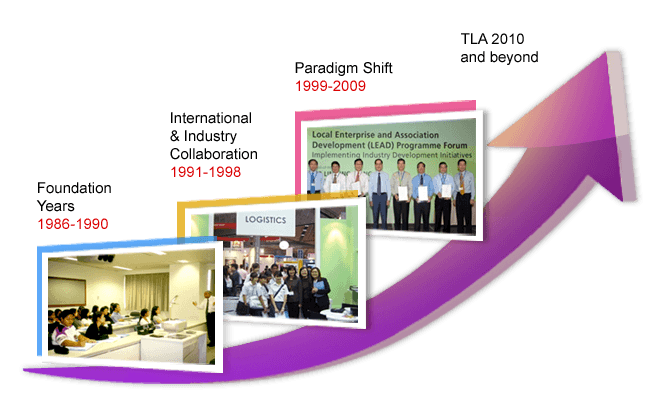Milestones

TLA 2010 and beyond
- The Logistics Academy Pte Ltd was incorporated on 25 February 2010 to enhance professionalism, skills and knowledge of supply chains and logistics
- The Logistics Academy Pte Ltd was granted a 4-year renewal as a Private Education Institute (24 Feb 2012 to 23 Feb 2016) (24 Feb 2016 to 23 Feb 2020) (24 Feb 2020 to 23 Feb 2024) (24 Feb 2024 to 23 Feb 2028)
Paradigm Shift: 1999 - 2009
SLA As Major Contributor to Industry & International Training Initiatives
- Changed name to Singapore Logistics Association
- Changed course syllabus to keep in tandem with the dynamic industry by introducing Specialist Training Programmes :
- Higher Diploma in Supply Chain Management
- Certificate / Diploma in Integrated Logistics Management
- Certificate / Diploma in International Freight Management
- Certificate / Diploma in Distribution Centre Management
SLA as Major Contributor to Industry Training Initiatives
- National Skills Recognition Systems (NSRS) : SLA became lead organization for NSRS in the logistics industry and chairs the Industry Skills Standard Committee (Logistics Industry).
- ITE/SLA Traineeship Programme – Certificate in Business Studies (Logistics) : The programme was launched as the Higher NITEC in Integrated Logistics Management course by ITE
- Strategic Manpower Conversion Programme (SMCP) for Logistics : SLA was appointed as Facilitator
- The Practitioner’s Definitive Guides series : SLA sets industry practices through publication of Airfreight Forwarding, Seafreight Forwarding and Multimodal Transport
- In-house training programmes : SLA developed and conducted for established organisations namely AEX Shipping, Keppel Logistics, SABIC Innovative Plastics , SDV Logistics, Singapore Airlines Cargo, Singapore Customs, Singapore Police Force, Toyota Tsusho, Ngee Ann Polytechnic and NTUC
- Local Enterprise & Association Development (LEAD) Programme : SLA was awarded LEAD programme. The training initiatives included :
- On-Line Learning Platform
- Supply Chain & Logistics Degree Course
- Scholarships to Groom & Retain Talents
- SLA Training Institute
- Supply Chain Security Practices
- Adoption of Best Practices
SLA as Major Contributor to International Training Initiatives
- SLA chaired FIATA ABVT represented by Mr Thomas Sim
- FIATA ABVT adopted the minimum standards for the Higher Diploma in Supply Chain Management proposed by SLA
- AFFA Working Group for Education and Training was headed by SLA, Mr Thomas Sim
- Diploma in International Freight Management was adopted as the AFFA Diploma
- Memorandum of Understanding were signed with international organizations namely :
- Mongolian Logistics Association
- Canadian Freight Forwarders Association
- UAE National Association of Freight & Logistics
- Supply Chain Logistics Association of Australia – Victoria and Queensland
- Taiwan International Logistics Association
- SLA conducted training for international bodies namely China International Freight Forwarders Association, Myanmar International Freight Forwarders Association and Taiwan International Logistics Association
International & Industry Collaboration: 1991 to 1998
International Collaboration
- SFFA was invited to help develop vocational training programmes of FIATA (International Federation of Freight Forwarders Associations) and UN ESCAP
- SFFA represented by Mr Stanley Lim as a member of the FIATA Advisory Vocational Training (ABVT), contributed to the setting of training requirements internationally
- SFFA became the focal point for education and training of AFFA (ASEAN Federation of Forwarders Associations)
International Recognition
- SFFA Diploma in Freight Forwarding successfully validated by FIATA
- SFFA Diploma graduates qualified for the FIATA Diploma of Competence in Freight Forwarding (By Vocational Training and Examination)
Industry Collaboration
- Certificate in Business Studies (Logistics), an apprenticeship programme, was jointly developed by SFFA and the Institute of Technical Education (ITE)
- Memorandum of Understanding was signed with Temasek Business School
Industry Recognition
- SFFA was certified as an Approved Training Centre by the ITE
- SFFA Diploma graduates gained admission as Associate Members of the Chartered Institute of Transport (AMCIT)
Foundation Years: 1986 - 1990
Foundation Years : 1986 – 1990
An uphill task for Singapore Freight Forwarders Association (SFFA) as there was no structured training programme in the industry :
- Manuals to be written specifically for personnel in the industry
- Lecturers to be recruited from within the ranks to ensure that training was relevant
SFFA received international and local assistance to develop and conduct its training programmes :
- UN ESCAP and UNCTAD Trainmar Resource Centre helped document first training manuals
- Skills Development Fund provided grants to participants
- National Productivity Board & Singapore Port Institute facilitated training course administration
- SFFA Diploma was awarded in 1991